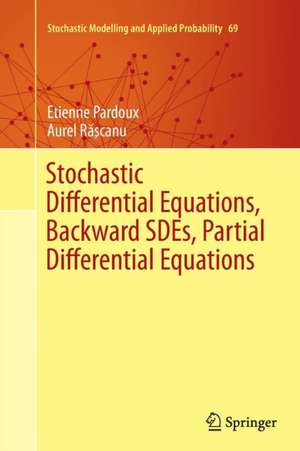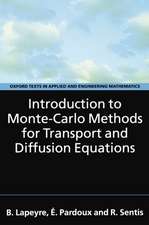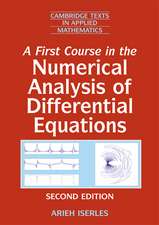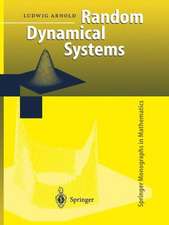Stochastic Differential Equations, Backward SDEs, Partial Differential Equations: Stochastic Modelling and Applied Probability, cartea 69
Autor Etienne Pardoux, Aurel Rӑşcanuen Limba Engleză Paperback – 23 aug 2016
Stochastic calculus and stochastic differential equations (SDEs) were first introduced by K. Itô in the 1940s, in order to construct the path of diffusion processes (which are continuous time Markov processes with continuous trajectories taking their values in a finite dimensional vector space or manifold), which had been studied from a more analytic point of view by Kolmogorov in the 1930s. Since then, this topic has become an important subject of Mathematics and Applied Mathematics, because of its mathematical richness and its importance for applications in many areas of Physics, Biology, Economics and Finance, where random processes play an increasingly important role. One important aspect is the connection between diffusion processes and linear partial differential equations of second order, which is in particular the basis for Monte Carlo numerical methods for linear PDEs. Since the pioneering work of Peng and Pardoux in the early 1990s, a new type of SDEs called backward stochastic differential equations (BSDEs) has emerged. The two main reasons why this new class of equations is important are the connection between BSDEs and semilinear PDEs, and the fact that BSDEs constitute a natural generalization of the famous Black and Scholes model from Mathematical Finance, and thus offer a natural mathematical framework for the formulation of many new models in Finance.
| Toate formatele și edițiile | Preț | Express |
|---|---|---|
| Paperback (1) | 1312.46 lei 38-44 zile | |
| Springer International Publishing – 23 aug 2016 | 1312.46 lei 38-44 zile | |
| Hardback (1) | 1274.43 lei 43-57 zile | |
| Springer International Publishing – 4 iul 2014 | 1274.43 lei 43-57 zile |
Din seria Stochastic Modelling and Applied Probability
- 17%
 Preț: 464.60 lei
Preț: 464.60 lei - 18%
 Preț: 805.44 lei
Preț: 805.44 lei - 18%
 Preț: 1110.72 lei
Preț: 1110.72 lei - 18%
 Preț: 947.35 lei
Preț: 947.35 lei -
 Preț: 390.84 lei
Preț: 390.84 lei - 18%
 Preț: 952.40 lei
Preț: 952.40 lei - 15%
 Preț: 648.56 lei
Preț: 648.56 lei - 18%
 Preț: 951.91 lei
Preț: 951.91 lei - 15%
 Preț: 637.13 lei
Preț: 637.13 lei - 18%
 Preț: 793.63 lei
Preț: 793.63 lei -
 Preț: 391.02 lei
Preț: 391.02 lei -
 Preț: 401.42 lei
Preț: 401.42 lei - 15%
 Preț: 639.08 lei
Preț: 639.08 lei - 18%
 Preț: 733.33 lei
Preț: 733.33 lei - 18%
 Preț: 785.11 lei
Preț: 785.11 lei - 15%
 Preț: 593.42 lei
Preț: 593.42 lei - 18%
 Preț: 1114.96 lei
Preț: 1114.96 lei - 15%
 Preț: 643.16 lei
Preț: 643.16 lei -
 Preț: 390.63 lei
Preț: 390.63 lei - 15%
 Preț: 645.60 lei
Preț: 645.60 lei - 15%
 Preț: 641.71 lei
Preț: 641.71 lei - 18%
 Preț: 954.62 lei
Preț: 954.62 lei - 15%
 Preț: 645.14 lei
Preț: 645.14 lei - 18%
 Preț: 947.50 lei
Preț: 947.50 lei - 18%
 Preț: 804.96 lei
Preț: 804.96 lei - 15%
 Preț: 644.63 lei
Preț: 644.63 lei - 20%
 Preț: 469.59 lei
Preț: 469.59 lei - 20%
 Preț: 581.39 lei
Preț: 581.39 lei
Preț: 1312.46 lei
Preț vechi: 1726.92 lei
-24% Nou
Puncte Express: 1969
Preț estimativ în valută:
251.13€ • 262.91$ • 207.80£
251.13€ • 262.91$ • 207.80£
Carte tipărită la comandă
Livrare economică 02-08 aprilie
Preluare comenzi: 021 569.72.76
Specificații
ISBN-13: 9783319347752
ISBN-10: 3319347756
Pagini: 684
Ilustrații: XVII, 667 p.
Dimensiuni: 155 x 235 x 35 mm
Greutate: 10.23 kg
Ediția:Softcover reprint of the original 1st ed. 2014
Editura: Springer International Publishing
Colecția Springer
Seria Stochastic Modelling and Applied Probability
Locul publicării:Cham, Switzerland
ISBN-10: 3319347756
Pagini: 684
Ilustrații: XVII, 667 p.
Dimensiuni: 155 x 235 x 35 mm
Greutate: 10.23 kg
Ediția:Softcover reprint of the original 1st ed. 2014
Editura: Springer International Publishing
Colecția Springer
Seria Stochastic Modelling and Applied Probability
Locul publicării:Cham, Switzerland
Cuprins
Introduction.- Background of Stochastic Analysis.- Ito’s Stochastic Calculus.- Stochastic Differential Equations.- SDE with Multivalued Drift.- Backward SDE.- Annexes.- Bibliography.- Index.
Recenzii
“This 668-page magnum opus of stochastic ODEs and PDEs belongs on the shelf of every researcher in these areas, as well as any mathematician or scientist who wants to learn more about the subject. … my opinion is that this book accomplished a Herculean task of making an arguably technical subject that is daunting to a beginner accessible. This book wants to be read!” (Mark A. McKibben, Mathematical Reviews, April, 2016)
“The present monograph gives a rather complete treatment of backward stochastic differential equations as tool for the stochastic interpretation of second order PDEs. As the reader is guided from basic knowledge on stochastic analysis through the Itō calculus and the theory of stochastic differential equations to that of the backward equations, the monograph represents in my eyes a precious textbook for Master students,PhD students, but also specialists in this domain.” (Rainer Buckdahn, zbMATH 1321.60005, 2015)
“The present monograph gives a rather complete treatment of backward stochastic differential equations as tool for the stochastic interpretation of second order PDEs. As the reader is guided from basic knowledge on stochastic analysis through the Itō calculus and the theory of stochastic differential equations to that of the backward equations, the monograph represents in my eyes a precious textbook for Master students,PhD students, but also specialists in this domain.” (Rainer Buckdahn, zbMATH 1321.60005, 2015)
Notă biografică
Etienne Pardoux: Born in 1947, graduated from Ecole Polytechnique (1970), Thesis Univ. Paris-Sud 1975, CNRS Research Assoc. 1970-79, Maître de Conférences, then Professor Univ. d’Aix-Marseille since 1979. Member of the Institute for Advanced Study, Princeton NJ, 1986-1987. Member of the Institut Universitaire de France, 1992-2002. Pardoux has published more than 140 papers on nonlinear filtering, stochastic partial differential equations, anticipating stochastic calculus, backward stochastic differential equations, homogenization and probabilistic models in evolutionary biology, and three books.
Aurel Rascanu: Born 1950, Graduated from “Alexandru Ioan Cuza” University of Iasi (UAIC-Iasi), Romania (1974), Thesis UAIC-Iasi 1983, Assistant (1978-1985), Lecturer (1985-1990), Doctor (1990-1997), Professor (since 1997) at UAIC-Iasi, Dean of Faculty of Mathematics (1990-1992) and Head of the Department of Applied Mathematics (2000-2004) at UAIC Iasi. He has written 35 scientific papers. His scientific research is in stochastic differential equations, stochastic variational inequalities, approximation and numerical simulation, stochastic optimal control, viability and invariance, and probabilistic methods in the study of partial differential equations.
Aurel Rascanu: Born 1950, Graduated from “Alexandru Ioan Cuza” University of Iasi (UAIC-Iasi), Romania (1974), Thesis UAIC-Iasi 1983, Assistant (1978-1985), Lecturer (1985-1990), Doctor (1990-1997), Professor (since 1997) at UAIC-Iasi, Dean of Faculty of Mathematics (1990-1992) and Head of the Department of Applied Mathematics (2000-2004) at UAIC Iasi. He has written 35 scientific papers. His scientific research is in stochastic differential equations, stochastic variational inequalities, approximation and numerical simulation, stochastic optimal control, viability and invariance, and probabilistic methods in the study of partial differential equations.
Textul de pe ultima copertă
This research monograph presents results to researchers in stochastic calculus, forward and backward stochastic differential equations, connections between diffusion processes and second order partial differential equations (PDEs), and financial mathematics. It pays special attention to the relations between SDEs/BSDEs and second order PDEs under minimal regularity assumptions, and also extends those results to equations with multivalued coefficients. The authors present in particular the theory of reflected SDEs in the above mentioned framework and include exercises at the end of each chapter.
Stochastic calculus and stochastic differential equations (SDEs) were first introduced by K. Itô in the 1940s, in order to construct the path of diffusion processes (which are continuous time Markov processes with continuous trajectories taking their values in a finite dimensional vector space or manifold), which had been studied from a more analytic point of view by Kolmogorov in the 1930s. Since then, this topic has become an important subject of Mathematics and Applied Mathematics, because of its mathematical richness and its importance for applications in many areas of Physics, Biology, Economics and Finance, where random processes play an increasingly important role. One important aspect is the connection between diffusion processes and linear partial differential equations of second order, which is in particular the basis for Monte Carlo numerical methods for linear PDEs. Since the pioneering work of Peng and Pardoux in the early 1990s, a new type of SDEs called backward stochastic differential equations (BSDEs) has emerged. The two main reasons why this new class of equations is important are the connection between BSDEs and semilinear PDEs, and the fact that BSDEs constitute a natural generalization of the famous Black and Scholes model from Mathematical Finance, and thus offer a natural mathematical framework for the formulation of many new models in Finance.
Stochastic calculus and stochastic differential equations (SDEs) were first introduced by K. Itô in the 1940s, in order to construct the path of diffusion processes (which are continuous time Markov processes with continuous trajectories taking their values in a finite dimensional vector space or manifold), which had been studied from a more analytic point of view by Kolmogorov in the 1930s. Since then, this topic has become an important subject of Mathematics and Applied Mathematics, because of its mathematical richness and its importance for applications in many areas of Physics, Biology, Economics and Finance, where random processes play an increasingly important role. One important aspect is the connection between diffusion processes and linear partial differential equations of second order, which is in particular the basis for Monte Carlo numerical methods for linear PDEs. Since the pioneering work of Peng and Pardoux in the early 1990s, a new type of SDEs called backward stochastic differential equations (BSDEs) has emerged. The two main reasons why this new class of equations is important are the connection between BSDEs and semilinear PDEs, and the fact that BSDEs constitute a natural generalization of the famous Black and Scholes model from Mathematical Finance, and thus offer a natural mathematical framework for the formulation of many new models in Finance.
Caracteristici
Written by experts Includes exercises at the end of each chapter Offers a natural mathematical framework for the formulation of many new models in Finance












